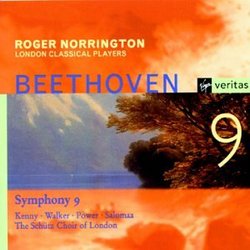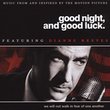| All Artists: Ludwig van Beethoven, Roger Norrington, Sarah Walker, London Classical Players, Winton Kenny, Yvonne Kenny, Patrick Power Title: Beethoven: Symphony No. 9 Members Wishing: 0 Total Copies: 1 Label: EMI Import Release Date: 7/8/1997 Album Type: Import Genre: Classical Styles: Historical Periods, Classical (c.1770-1830), Symphonies Number of Discs: 1 SwapaCD Credits: 1 UPC: 724356137820 |
Search - Ludwig van Beethoven, Roger Norrington, Sarah Walker :: Beethoven: Symphony No. 9
 | Ludwig van Beethoven, Roger Norrington, Sarah Walker Beethoven: Symphony No. 9 Genre: Classical
This bitingly ugly performance turns Beethoven's Ninth into a circus act. Roger Norrington has two basic interpretive modes: louder, and faster, except where the music should be grand and exciting, in which case he spares ... more » ![header=[] body=[This CD is available to be requested as disc only.]](/images/attributes/disc.png?v=5b450bfd) ![header=[] body=[This CD is available to be requested with the disc and back insert.]](/images/attributes/disc_back.png?v=5b450bfd) ![header=[] body=[This CD is available to be requested with the disc and front insert.]](/images/attributes/disc_front.png?v=5b450bfd) ![header=[] body=[This CD is available to be requested with the disc, front and back inserts.]](/images/attributes/disc_front_back.png?v=5b450bfd) |
Larger Image |
CD DetailsSynopsis
Amazon.com This bitingly ugly performance turns Beethoven's Ninth into a circus act. Roger Norrington has two basic interpretive modes: louder, and faster, except where the music should be grand and exciting, in which case he spares no effort to diminish the impact of Beethoven's inspiration. The finale, in particular, sounds like a campfire sing-along, so amateurish is Norrington's scamper through it to the finish line. A crassly vulgar display. --David Hurwitz Similarly Requested CDs
|
CD ReviewsAn Unfortunate Review for an Incredible Performance new music guy | 01/25/1999 (5 out of 5 stars) "I demand a second opinion! David Hurwitz's review is an injustice, not only to Roger Norrington, but to Beethoven as well. Fast and fierce the performance is - and a more natural interpretation I have never heard. A century's worth of slow, maudlin romanticist interpretation has unfortunately coloured many eyes. But Beethoven was not a romantic, he was a composer of early music. His music, truly played, instills a sentiment of joy, Beethoven's favorite emotion, and mine as well, I am happy to say. Those who harken back to before Norrington or Harnoncourt would reduce the Ninth to mushy movie music, because it is what they are used to hearing, via tradition." Great period recording! (Hurwitz Shmurwitz) new music guy | NY, NY United States | 11/08/2002 (4 out of 5 stars) "I could only laugh when I read the amazon.com editorial review. It really is a wonderful bit of evidence that we live in a world in which a complete ignoramus, with a little hard work and some put-downs, is capable of rising almost to the middle of the field of music criticism.While perhaps Norrington is going too far in implying that this is the way Beethoven "must" be played, it is difficult to argue with his tempi, since he is following Beethoven's metronome markings. It is certainly jarring to hear the trio of the scherzo and the turkish march so much slower than we're used to, and the recitatives and the entire third movement so much faster than normal, but it doesn't sound *wrong*. Just different. And very interesting. And by the end, exhilirating. The orchestra has a beautiful sound, and if not perfectly in tune at all times, it's close enough to not be overly bothersome. Some lines come out more than they would in a modern orchestra, in particular the horns and timpani, but they both sound great. My one quibble is with the soloists, whose consistently wide vibrato is irritating and doesn't fit in. Nevertheless, for all the (quite legitimnate) raves about Szell, I'd take this recording over his anyday." A refreshing performance 04/06/1999 (5 out of 5 stars) "Roger Norrington clearly has done a significant amount or research in preparing for this magnificent performance. Of note is his focus on the tempi - to try to approximate what Beethoven might have had in mind while composing the music. For ears more used to the romantic/orchestral sound of Ormandy, Bernstein, Stokowski, et.al., this is a refreshing change. Additionally, the typical 100 piece orchestra, as the above mentioned conductors were wont to conduct, make the music loud rather than powerful. Mr. Norrington's use of a smaller orchestra allows the music to sing rather than bellow. What Mr. Norrington has achieved here is magic rarely heard - a performance so compelling that the music transcends the performers; rather than hearing artists performing, you hear Beethoven's music."
|

 Track Listings (12) - Disc #1
Track Listings (12) - Disc #1







